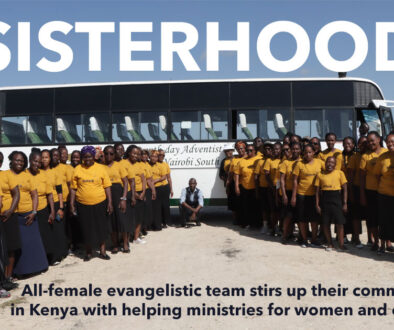New Method for Votes to be Introduced at 2015 General Conference Session
By AT News Team, Feb. 5, 2015: Delegates to the Seventh-day Adventist denomination’s General Conference (GC) Session in July won’t hold up yellow cards to vote as they did five years ago at the last meeting. Instead, for the first time, delegates will vote by pressing a button on an electronic device.
The new method will tally votes immediately and display the results in a bar chart on a screen. The technology will provide greater accuracy and assure a secret ballot, perhaps relieving the concern that some delegates may be pressured to vote a certain way.
At the 1990 and 1995 GC sessions observers reported that some entire delegations all voted the same way and rumors circulated that delegates had been told they must support a specific view. The same controversial issues about ordination and the role of women in the church will be on the agenda again this year.
The GC Session is the top governing body in the denomination. It meets once every five years to elect the top denominational officials, as well as consider amendments to the three most important documents in the organization; the bylaws, the Statement of Fundamental Beliefs and the Church Manual. It does not make policy or financial decisions, but other issues can be placed before the delegates by vote of the GC executive committee.
“Technology impacts our lives in many ways, and we’re continually looking for ways in which technology can improve our systems,” the Adventist News Network (ANN) quoted Pastor Myron Iseminger, undersecretary of the denomination.
Iseminger, who has worked as a church administrator in several regions of the world, told ANN the electronic system will also help people from cultures who face tension between following their convictions and following their regional leader. “I think in many cultures delegates are caught in a difficult spot because, on one hand, we encourage them to prayerfully vote their conscience, but on the other hand, showing respect to their local leader sitting nearby is also very important,” Iseminger said. “We hope that particular pressure will be removed this time. We want to be transparent and fair, and I think this is a great step forward.”
Denominational officials will rent several thousand remote voting devices from a company that will also administer the process. The denomination’s Inter-American Division, based in Miami and including the Caribbean basin, is acquiring its own voting system. The annual meeting of the GC executive committee has used electronic voting for a number of years which has given the denomination’s Secretariat some experience with this type of technology. Some conference constituency meetings have also used electronic voting.
Pastor Max Torkelsen, president of the North Pacific Union Conference in the United States, told ANN that he has been involved in denominational meetings where electronic voting was used since the late 1990s. The transition away from voting cards and voice votes led to more “credibility” of the process he said, particularly for people who voted against an item that passed. “They know their vote was counted. It raises people’s level of confidence [about] the vote,” he said.
All of the sources that Adventist Today contacted declined to speculate about the possibility that technology could be used to hijack the vote on a particularly controversial and important item. Some individuals and independent groups have expressed very strong feelings about the question on ordination that has been referred to the 2015 GC Session, although most of these will not have delegate credentials and some are not members of the denomination.
The upcoming session begins July 2 and runs through July 11 in San Antonio, Texas. About 2,600 voting delegates will attend as well as perhaps as many as 50,000 observers. Adventist Today will publish a special issue of its magazine in advance of the session with background information on the various issues on the agenda, the procedures used in handling denominational business, etc.



